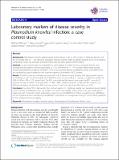Laboratory markers of disease severity in Plasmodium knowlesi infection: a case control study
Abstract
Background: Plasmodium knowlesi malaria causes severe disease in up to 10% of cases in Malaysian Borneo and has a mortality rate of 1 - 2%. However, laboratory markers with the ability to identify patients at risk of developing complications have not yet been assessed as they have for other species of Plasmodium. Methods: A case control study was undertaken in two hospitals in Sarikei and Sibu, Malaysian Borneo. One hundred and ten patients with uncomplicated (n = 93) and severe (n = 17) P. knowlesi malaria were studied. Standardized pigment-containing neutrophil (PCN) count, parasite density and platelet counts were determined and analysed by logistic regression and receiver operating characteristic (ROC) analysis. Results: The PCN count was strongly associated with risk of disease severity. Patients with high parasite density (>= 35,000/mu l) or with thrombocytopaenia (<= 45,000/mu l) were also more likely to develop complications (odds ratio (OR) = 9.93 and OR = 5.27, respectively). The PCN count yielded the highest area under the ROC curve (AUC) estimate among all markers of severity (AUC = 0.8561, 95% confidence interval: 0.7328, 0.9794). However, the difference between all parameter AUC estimates was not statistically significant (Wald test, p = 0.73). Conclusion: Counting PCN is labour-intensive and not superior in predicting severity over parasitaemia and platelet counts. Parasite and platelet counts are simpler tests with an acceptable degree of precision. Any adult patient diagnosed with P. knowlesi malaria and having a parasite count >= 35,000/mu l or >= 1% or a platelet count <= 45,000/mu l can be regarded at risk of developing complications and should be managed according to current WHO guidelines for the treatment of severe malaria.
Citation
Willmann , M , Ahmed , A , Siner , A , Wong , I T , Woon , L C , Singh , B , Krishna , S & Cox Singh , J 2012 , ' Laboratory markers of disease severity in Plasmodium knowlesi infection: a case control study ' , Malaria Journal , vol. 11 , no. 363 , 363 . https://doi.org/10.1186/1475-2875-11-363
Publication
Malaria Journal
Status
Peer reviewed
ISSN
1475-2875Type
Journal article
Description
This study was funded by the Medical Research Council (MRC) UK; Grant number G0801971, and the London School of Hygiene and Tropical Medicine (Trust Funds award)Collections
Items in the St Andrews Research Repository are protected by copyright, with all rights reserved, unless otherwise indicated.

